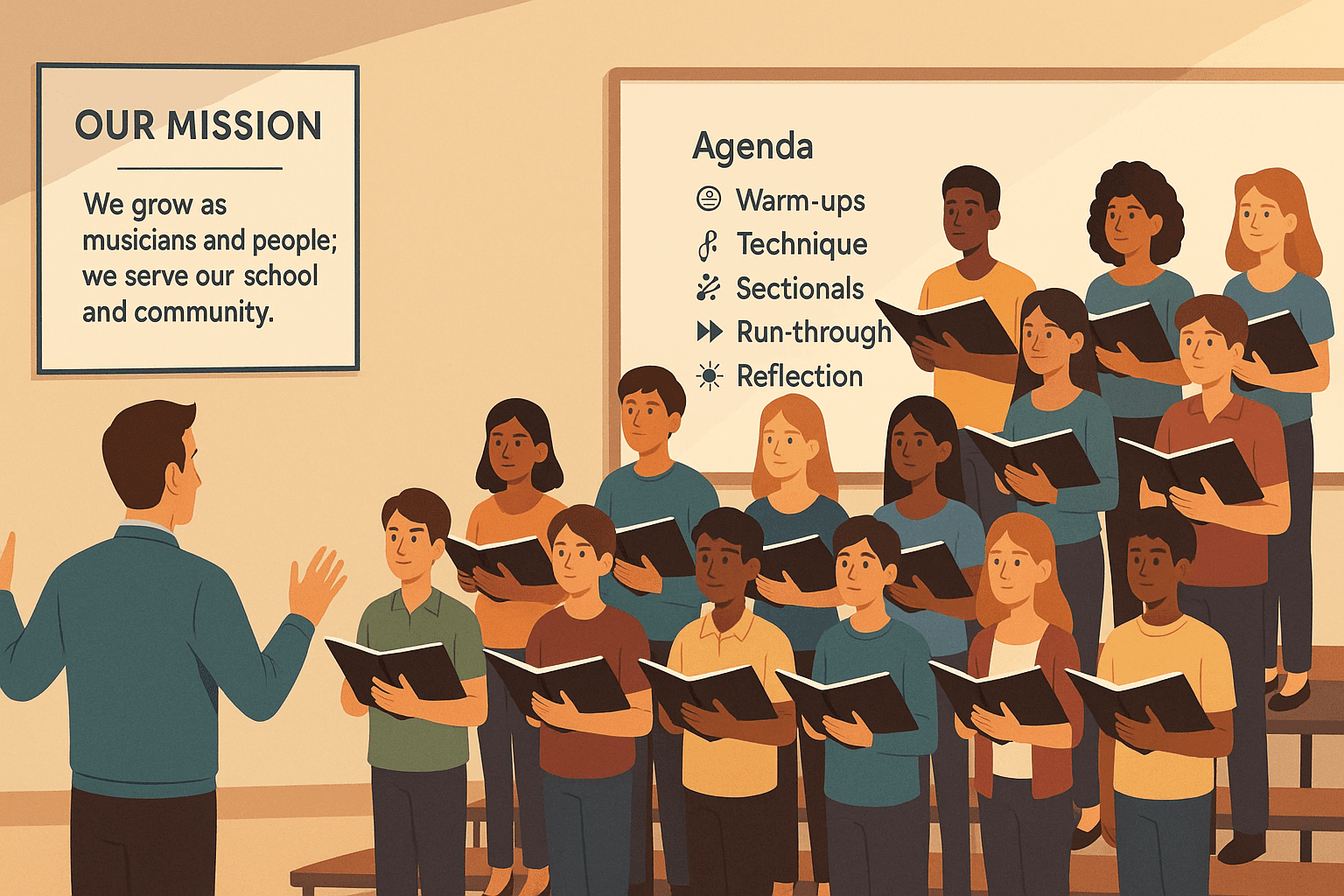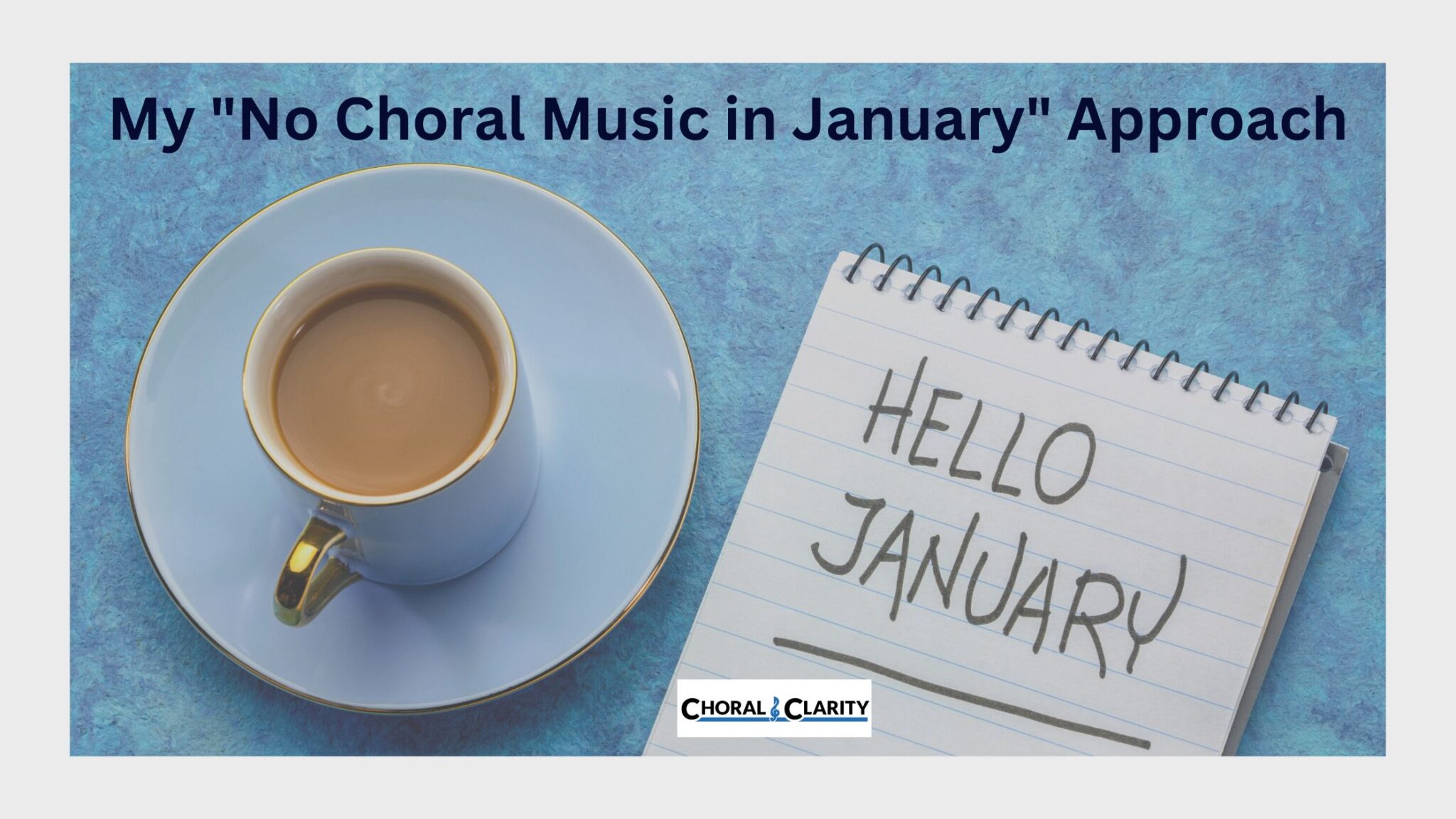The New Year allows both students and directors the opportunity for a fresh start. We may be half-way through our academic year, but there are several factors that allow us to push the reset button and do things differently.
In terms of making sweeping rehearsal changes or reinforcing things that we’ve been letting slide for months, we have 3 factors in our favor:
1. After the New Year, virtually everyone (students and teachers) wants to start off on the right foot.
2. Our winter concert is over which automatically puts us into a different rehearsal mode.
3. We’ve had a long break, which resets the daily rehearsal repetition.
-
Product on sale
 “Aural Training Sheet” BUNDLE – Major, Relative Minor, Original, and Assessment RubricOriginal price was: $16.97.$12.99Current price is: $12.99.
“Aural Training Sheet” BUNDLE – Major, Relative Minor, Original, and Assessment RubricOriginal price was: $16.97.$12.99Current price is: $12.99. -
Product on sale
 The Ultimate Aural Training Assessment & Development BundleOriginal price was: $39.96.$27.99Current price is: $27.99.
The Ultimate Aural Training Assessment & Development BundleOriginal price was: $39.96.$27.99Current price is: $27.99. -
Product on sale
 Post Concert Self-Assessment/Alternative Assignment BUNDLEOriginal price was: $22.94.$19.96Current price is: $19.96.
Post Concert Self-Assessment/Alternative Assignment BUNDLEOriginal price was: $22.94.$19.96Current price is: $19.96.
If we have been unhappy with the flow of rehearsals, our productivity, the work ethic of our singers, the disruptions that were occurring, the “respect” in the classroom, etc., now is a perfect time to make some changes.
Try SIGHT READING FACTORY and save 10% using code: choralclarity
Singorama – Essential Guide To Singing
Here are 8 Tips for Restarting Rehearsals after the New Year:
1. Review your pre-established behavioral management plan
Review this plan on your own (Guidelines/Behavioral Re-directions or Rules/Consequences) and see if it needs any tweaking. If you have let behaviors slip, is it because your guidelines weren’t clear enough? Do your guidelines need tweaking or is it your reinforcement of the guidelines that caused students to disengage and/or disrupt? Either way, refreshing your awareness of the rehearsal guidelines and behavioral re-directions will improve the effectiveness of your students.
2. Re-teach your behavioral management plan
It only takes a few minutes to re-teach it. It involves reminding the students what the rehearsal guidelines are and why they have been created. Explain the reasons why following the guidelines will make better rehearsals for them. From there, reinforce positive behaviors as much as positive and pinpoint any time a student doesn’t follow one of your class guidelines.
3. Reinforce routines/procedures
Some procedures are more important than others; the ones that have a great impact on the rehearsal should be reviewed with your students. Some examples of ones I will be reviewing with my students: where to place late passes, bathroom sign-in/sign-out, how all important class information is going to be disseminated.
4. Give an open-book handbook quiz
This is an easy way to reinforce anything that is important within your class. If you’ve realized certain guidelines or procedures have been recently overlooked, here is a good tool to reinforce this information along with other information such as upcoming performance dates.
I suggest reviewing all information prior to giving this quiz, as your goal is to reinforce this information; students can earn a high score while you have ensured they know what is expected of them moving forward. You may want to give a take-home handbook quiz that requires a parent signature, as this ensures your parents have seen the most important dates/policy information moving forward.
Here are some examples of the types of questions I recommend asking:
- When is the next concert? (date and time)
- What are the 5 guidelines for the class?
- What am I required to bring to class every day?
- What is required in order to receive full participation in a rehearsal?
- What is the bathroom policy?
- True/False: my body alignment while singing counts as part of my daily class participation grade
5. Make aural training a priority
Aural training can be an effective part of any solid class warm-up. Engaging the inner ear requires tremendous focus from a group. After singing a scale, and intervals (3rds, 4ths, 5ths, triads, etc), I recommend using an aural training sheet from The Best Ear-Training Exercise You Will Ever Use.
Try SIGHT READING FACTORY and save 10% using code: choralclarity
6. Make Sight-Singing a Priority
Now is a great time to prioritize skills over concert music. The time investment of two minutes per day will speed up the learning process of music. I highly suggest purchasing a teacher’s subscription to Sight Reading Factory (roughly $35) because it requires no extra preparation on your part and your singers will be able to perform 2-3 well-suited exercises in under 2 minutes of rehearsal time.
Try SIGHT READING FACTORY and save 10% using code: choralclarity
7. Ease back in with rounds
Unison singing is a great way to engage our singers after a long break, on top of just being in serious concert mode. When starting all over again, a round provides some relatively quick singing success. It engages all students at once with the melody; they are generally singing with more range, similar to the vocal warm-ups, as opposed to a choral work, where they are sitting in a limited tessitura.
Rounds allows us to re-focus our energy on tone, vowels, and consonants first in unison prior to breaking up into harmony. Even the most advanced choral groups can benefit from a round or two after a long break.
8. Engage all singers at once with Solo Repertoire
While rounds are a great way to begin, I also believe solo repertoire is a healthy gateway into developing confident choral singers. Solo repertoire establishes healthy vocal technique.
There’s endless repertoire that could benefit singers of all ages and ability levels a the same time: mid-range arias, art songs, Broadway ballads, etc. When singing a melody in unison, it is easy for our singers to be expressive as we can focus on tone/vowels/consonants and keep them all focused.
New Year but Same Choir
While we are starting anew in many ways, our choir has a 4-5 month history together. It’s helpful to continually draw upon the “wins” from the first half of the year and remind our singers of how far they have come.
Happy New Year!
-
Product on sale
 The Ultimate Aural Training Assessment & Development BundleOriginal price was: $39.96.$27.99Current price is: $27.99.
The Ultimate Aural Training Assessment & Development BundleOriginal price was: $39.96.$27.99Current price is: $27.99. -
Product on sale
 Self-Assessment TOTAL BUNDLEOriginal price was: $142.88.$29.89Current price is: $29.89.
Self-Assessment TOTAL BUNDLEOriginal price was: $142.88.$29.89Current price is: $29.89. -
Product on sale
 The Best Aural Training Exercise – “Original”Original price was: $12.99.$9.99Current price is: $9.99.
The Best Aural Training Exercise – “Original”Original price was: $12.99.$9.99Current price is: $9.99.
The Pure Pitch Method – Perfect Pitch Ear Training








Leave A Comment